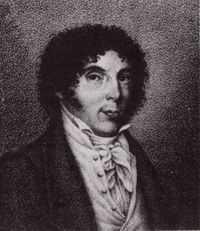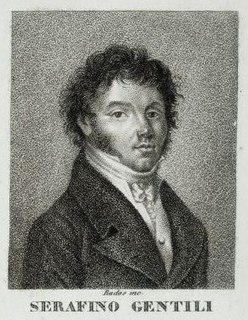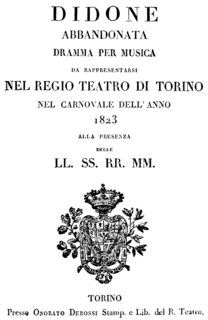
L'amor coniugale (Conjugal Love) is an opera in one act by Simon Mayr set to an Italian libretto by Gaetano Rossi. It premiered at Padua's Teatro Nuovo on 26 July 1805.

L'amor coniugale (Conjugal Love) is an opera in one act by Simon Mayr set to an Italian libretto by Gaetano Rossi. It premiered at Padua's Teatro Nuovo on 26 July 1805.
Like Beethoven's Fidelio , the libretto of L'amor coniugale is based on Jean-Nicolas Bouilly's French libretto for Pierre Gaveaux's 1798 opera Léonore, ou l'amour conjugal . [1] Unlike Fidelio which focuses on the struggle for political liberty, Mayr's opera, also known as Il custode di buon cuore (The Good-hearted Jailer) and described in its libretto as a farsa sentimentale, focuses more on the interpersonal relationships between the protagonists and contains comic elements. [2] Rossi condensed Bouilly's two-act libretto into one act containing 19 scenes and changed the setting from the Napoleonic Wars to 17th century Poland.
L'amor coniugale premiered at the Teatro Nuovo in Padua on 26 July 1805 in a double bill with the premiere of Pietro Carlo Guglielmi's La donna di spirito. It was then performed the following September at the Teatro San Benedetto in Venice. Although rarely performed now, it was revived at the Teatro Donizetti in Bergamo in November 1984 conducted by Bruno Moretti and in Germany at the 2004 Rossini in Wildbad Festival conducted by Christopher Franklin. The Wildbad performance used a revised score by Arrigo Gazzaniga and was issued by the Naxos Records label.
| Role | Voice type | Premiere cast [3] 26 July 1805 |
|---|---|---|
| Zeliska, in disguise, Malvino | soprano | Margherita Chabrand |
| Amorveno, Zeliska's imprisoned husband | tenor | Savino Monelli [lower-alpha 1] |
| Peters, the jailer | bass | Carlo Angrisani |
| Floreska, Peters' daughter | soprano | Clementina Veglia |
| Moroski, the governor | bass | Natale Veglia |
| Ardelao, Amorveno's brother | tenor | Carlo Merusi |

Jean-Nicolas Bouilly was a French playwright, librettist, children's writer, and politician of the French Revolution. He is best known for writing a libretto, supposedly based on a true story, about a woman who disguises herself as a man to rescue her husband from prison, which formed the basis of Beethoven's opera Fidelio as well as a number of other operas.

La cambiale di matrimonio is a one-act operatic farsa comica by Gioachino Rossini to a libretto by Gaetano Rossi. The libretto was based on the play by Camillo Federici (1791) and a previous libretto by Giuseppe Checcherini for Carlo Coccia's 1807 opera, Il matrimonio per lettera di cambio. The opera debuted on 3 November 1810 at the Teatro San Moisè in Venice. It had a run of thirteen performances at Teatro San Moisè.

Sancia di Castiglia is an Italian opera seria in two acts by Gaetano Donizetti to a libretto by Pietro Salatino. It was first performed at the Teatro San Carlo in Naples on 4 November 1832, conducted by Nicola Festa.

Pierre Gaveaux was a French operatic tenor and composer, notable for creating the role of Jason in Cherubini's Médée and for composing Léonore, ou L’amour conjugal, the first operatic version of the story that later found fame as Fidelio.

Leonora, ossia L’amore coniugale is an opera in two acts by the Italian composer Ferdinando Paer. The libretto, by Giovanni Schmidt, is based on Léonore, ou L’amour conjugal (1794) by Jean-Nicolas Bouilly, which was also the source of Beethoven's Fidelio. Beethoven himself owned a score of Paer's opera and it is believed to have had some influence on his work. Leonora was first performed at the Kleines Kurfürstliches Theater, Dresden, on 3 October 1804 with the composer's wife singing the title role.
Ginevra di Scozia is an opera in two acts by Simon Mayr set to an Italian libretto by Gaetano Rossi based on Antonio Salvi's Ginevra, principessa di Scozia, which in turn was adapted from cantos 5 and 6 of Ludovico Ariosto's Orlando Furioso. Ginevra di Scozia premiered on 21 April 1801 at the Regio Teatro Nuovo in Trieste to celebrate the inauguration of the new theatre. The story is virtually identical to that of Handel's Ariodante which shares the same source for the libretto.
Raffaele Scalese (1800–1884) was an Italian operatic bass who specialized in the opera buffa repertoire. He was active in Italy's major opera houses from the mid-1820s up into the 1860s. He also appeared internationally in opera houses in Austria, Portugal, and France. The last years of his career were spent performing in Paris in the late 1860s where he remained after his retirement from the stage.
Ferdinando Orlandi, also referred to as Orland and Orlando. Little is known of his early life and his year of birth is also cited as 1777. He was an Italian musician and teacher of singing who composed cantatas and sacred music, but was particularly known for his operas, not all of which have survived. He was born and died in Parma.

Adelaide Malanotte was an Italian operatic contralto who performed in major opera houses in Italy from 1806–1821. She is best known for creating the title role in the world premiere of Gioachino Rossini's Tancredi in 1813. After her marriage, she performed under the name Adelaide Montresor. Her son, Giovanni Battista Montresor, had a career as a tenor and impresario in the United States. From 1812 until her death 20 years later she carried on an extra-marital affair with the poet Luigi Lechi.

Stefano Pavesi was an Italian composer. Born in Casaletto Vaprio, he is primarily known as a prolific opera composer, but he also served as the maestro di cappella of Crema Cathedral from 1818 until his death in Crema at the age of 71.

Teatro San Samuele was an opera house and theatre located at the Rio del Duca, between Campo San Samuele and Campo Santo Stefano, in Venice. One of several important theatres built in that city by the Grimani family, the theatre opened in 1656 and operated continuously until a fire destroyed the theatre in 1747. A new structure was built and opened in 1748, but financial difficulties forced the theatre to close and be sold in 1770. The theatre remained active until 1807 when it was shut down by Napoleonic decree. It reopened in 1815 and was later acquired by impresario Giuseppe Camploy in 1819. In 1853 the theatre was renamed the Teatro Camploy. Upon Camploy's death in 1889, the theatre was bequeathed to the City of Verona. The Venice City Council in turn bought the theatre and demolished it in 1894.

L'amore medico is an opera in two acts by composer Ermanno Wolf-Ferrari. Based on Molière's comedy L'Amour médecin, the work uses an Italian language libretto by Enrico Golisciani. It premiered in a German version by Richard Batka on 4 December 1913 at the Hoftheater in Dresden under the title Der Liebhaber als Arzt.

Zemira is an opera seria in three acts by Francesco Bianchi. The libretto was by Gaetano Sertor.

Serafino Gentili was an Italian opera singer particularly known for his performances in tenore di grazia roles. He sang in opera houses throughout Italy as well as in Paris and Dresden. During the course of his career, he created the role of Lindoro in Rossini's L'italiana in Algeri as well as leading roles in several other operas by less well-known composers. In his later years, he went by the surname Gentili-Donati to distinguish himself from the tenor Pietro Gentili.
Calisto Bassi was an Italian opera librettist.

Fanny Eckerlin (1802–1842) was an Italian mezzo-soprano who also sang contralto roles. During her career she was highly regarded, drawing favorable comparisons to Benedetta Rosmunda Pisaroni, but today she is remembered, if at all, for her association with the early career of Gaetano Donizetti, including creating the title role in his first publicly-performed opera, Enrico di Borgogna.

Cleopatra is an 1876 opera by Lauro Rossi to a libretto by Marco D'Arienzo based on Shakespeare's Antony and Cleopatra. The opera was first performed on 5 March 1876 at the Teatro Regio in Turin.

Didone abbandonata is an 1823 opera in two acts by Saverio Mercadante to a libretto by Andrea Leone Tottola after Metastasio's Didone abbandonata. It was first performed on 18 January 1823 at the Teatro Regio in Turin.
Léonore, ou L'Amour conjugal is an Opéra comique in two acts by Pierre Gaveaux after a libretto by Jean-Nicolas Bouilly. It was premiered on 19 February 1798 at the Théâtre Feydeau in Paris.
Pio Botticelli was an Italian bass-baritone active in the opera houses of Italy from 1810 until the mid-1840s. Amongst the numerous roles he created in world premieres were Pietro il Grande in Donizetti's Il falegname di Livonia and The Caliph in Pacini's La schiava in Bagdad. He also sang the role of Leucippo in the Austrian premiere of Rossini's Zelmira.